Hair knowledge
What are the distinctions between hair extensions and wigs?
In today’s beauty landscape, achieving the perfect hairstyle has become increasingly accessible, thanks to a variety of hair enhancement products. Among the most popular options are hair extensions and wigs, both of which offer unique benefits for anyone looking to change their look or enhance their natural hair. However, despite their popularity, many individuals remain unsure about the fundamental differences between these two products.
Hair extensions and wigs serve distinct purposes and cater to different needs, making it essential to understand how they differ to make an informed choice. In this article, we will delve into the definitions, key distinctions, benefits and drawbacks of hair extensions and wigs, and provide guidance on choosing the right option for your needs. By the end, you will have a clearer understanding of which product best suits your hair goals, lifestyle, and personal preferences.
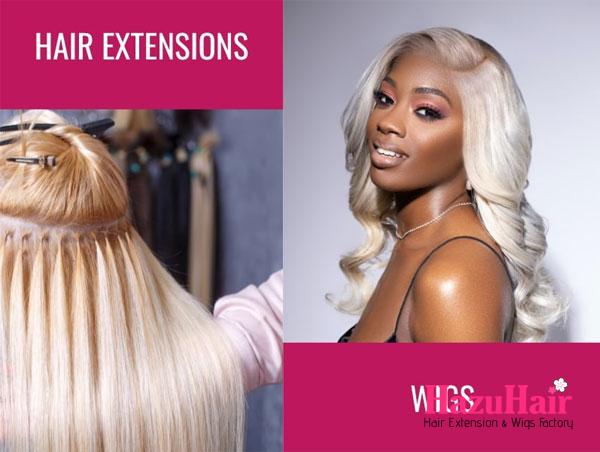
Definitions of Hair Extensions and Wigs
Understanding the definitions of hair extensions and wigs is crucial to appreciating their distinct roles in hair styling and enhancement. Here, we will explore each term in detail.
Hair Extensions
Hair extensions are artificial or natural strands of hair that are attached to one’s existing hair to enhance its length, volume, or texture. They come in various forms and can be made from synthetic fibers or human hair. The primary purpose of hair extensions is to add fullness or length to natural hair without the need for a complete overhaul of one’s hairstyle.
Types of Hair Extensions:
- Clip-In Extensions: These are temporary extensions that can be easily attached and removed. They are perfect for those who want to change their hairstyle for special occasions.
- Tape-In Extensions: These involve adhesive strips that bond the extensions to natural hair and are designed for semi-permanent wear, lasting several weeks.
- Sew-In Extensions: Also known as wefts, these extensions are sewn into braids of natural hair and are ideal for individuals with thicker hair.
- Fusion Extensions: These involve keratin bonds that fuse the extensions to natural hair using heat, providing a long-lasting option.
Benefits of Hair Extensions:
- Versatility: Extensions allow users to experiment with different hairstyles, lengths, and colors without committing to permanent changes.
- Natural Look: High-quality extensions, especially those made from human hair, can blend seamlessly with natural hair.
- Quick Transformation: Hair extensions can significantly change a person’s look within minutes, making them a popular choice for special occasions.
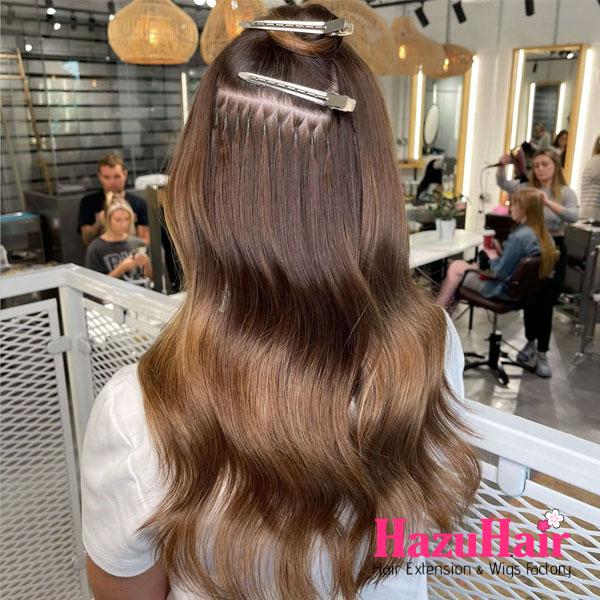
Wigs
Wigs, on the other hand, are complete hairpieces that cover the entire scalp, providing a transformative appearance. They are designed to resemble natural hair and can be made from synthetic fibers or human hair. Wigs can serve both aesthetic and functional purposes, appealing to a broad audience.
Types of Wigs:
- Full Wigs: These cover the entire head and are available in various styles, colors, and lengths. They can be worn daily or for special events.
- Half Wigs: These are designed to blend with natural hair and cover only part of the head, allowing for more styling options.
- Lace Front Wigs: These wigs feature a lace front that provides a natural hairline, making them suitable for those who want a realistic look.
- Medical Wigs: Often worn by individuals experiencing hair loss due to medical conditions or treatments, these wigs are designed for comfort and realism.
Benefits of Wigs:
- Complete Transformation: Wigs allow for an entirely new hairstyle without altering natural hair.
- Convenience: They are easy to wear and can be quickly removed, making them ideal for those who want to change their look frequently.
- Hair Loss Solution: Wigs can provide a practical solution for individuals facing hair loss due to various reasons, including medical conditions and treatments.
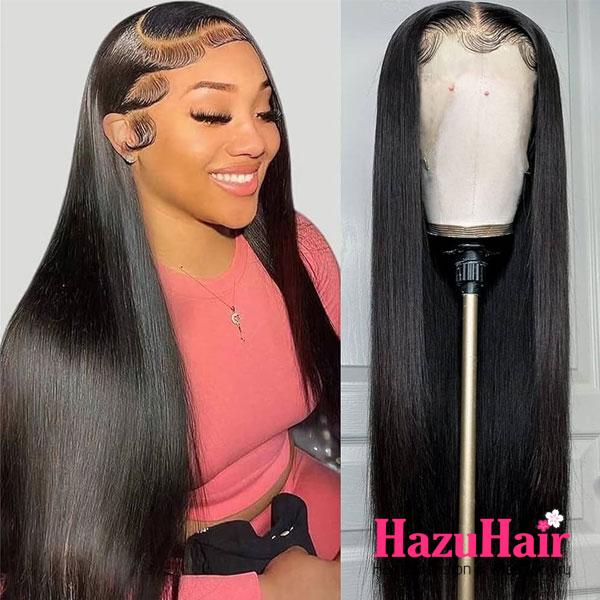
Key Differences Between Hair Extensions and Wigs
Understanding the distinctions between hair extensions and wigs is essential for individuals looking to enhance their hairstyles or address specific hair needs. While both options provide aesthetic benefits, they serve different purposes and come with unique characteristics. Here, we outline the key differences:
Purpose and Functionality
Hair Extensions:
- Enhancement of Existing Hair: Hair extensions are primarily used to add length, volume, or texture to one’s existing hair. They are designed to seamlessly blend with natural hair, allowing for various styling options.
- Temporary or Semi-Permanent Solutions: Depending on the type, extensions can be temporary (like clip-in extensions) or semi-permanent (like tape-in or sew-in extensions). Users can easily attach and remove them, making them versatile for different occasions.
Wigs:
- Complete Transformation: Wigs provide a complete change in appearance by covering the entire scalp. They are ideal for those seeking a dramatic shift in style, color, or length without altering their natural hair.
- Daily Wear or Specific Needs: Wigs can be worn daily or for special events and are often used by individuals experiencing hair loss due to medical conditions, providing a functional solution in addition to an aesthetic one.
Construction and Application
Hair Extensions:
- Attachment Methods: Extensions can be attached using various methods, such as clips, tape, sewing, or keratin bonds. The application process can vary in complexity and permanence, depending on the chosen type.
- Natural Hair Integration: Extensions are integrated into natural hair, allowing for versatility in styling. They blend with the natural hair, making them a favored choice for adding volume and length.
Wigs:
- Complete Hairpiece: Wigs are constructed as standalone hairpieces that cover the entire head. They come with different cap constructions, such as lace fronts or full caps, designed to provide comfort and a natural look.
- Variety in Design: Wigs are available in a wide range of styles, colors, and lengths. Users can choose from various options that do not require any integration with their natural hair.
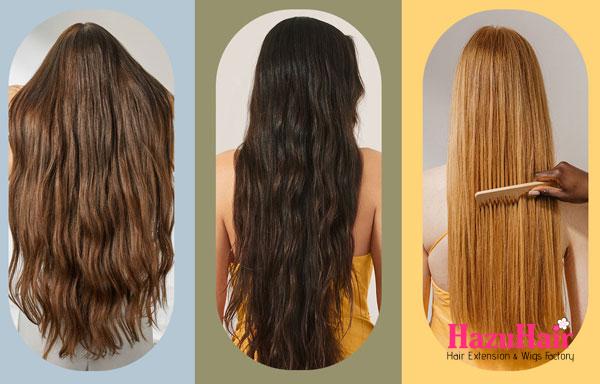
Maintenance and Care
Hair Extensions:
- Care Similar to Natural Hair: Extensions require care similar to that of natural hair, including regular washing, conditioning, and styling. Depending on the type, some extensions may require special care to maintain their quality and appearance.
- Longevity Based on Care: The lifespan of hair extensions can vary based on the type and the level of maintenance. High-quality extensions can last several months if properly cared for.
Wigs:
- Specific Maintenance Requirements: Wigs, especially those made from synthetic fibers, may require different care routines compared to natural hair. Proper washing and storage techniques are essential to maintain their shape and style.
- Longevity Depends on Material: The lifespan of wigs can differ based on the material used. Human hair wigs typically last longer than synthetic wigs, which may show wear and tear more quickly.
Cost Considerations
Hair Extensions:
- Variable Pricing: The cost of hair extensions can vary widely depending on the type, quality, and brand. Clip-in extensions are generally more affordable, while high-quality, long-lasting extensions like sew-ins or fusions can be more expensive.
- Potential Additional Costs: Users may need to consider additional costs for application and maintenance, particularly for semi-permanent extensions that require professional installation.
Wigs:
- Range of Prices: Wigs also come in various price ranges, depending on the material (synthetic vs. human hair), brand, and complexity of design. High-quality human hair wigs can be a significant investment.
- One-Time Purchase: Unlike extensions, which may require ongoing maintenance and replacement, wigs are often a one-time purchase that can last for months or years with proper care.

Choosing the Right Option for Your Needs
When deciding between hair extensions and wigs, it’s important to consider several factors to ensure that you choose the option that best suits your lifestyle, preferences, and specific hair goals. Here are some key considerations to help guide your decision:
Assess Your Hair Goals
Length and Volume:
- Hair Extensions: If your primary goal is to add length or volume to your existing hair, hair extensions are likely the better option. They can be seamlessly blended with your natural hair, allowing you to achieve a fuller look without the need for drastic changes.
- Wigs: If you are looking for a complete transformation in length, style, or color, a wig might be the ideal choice. Wigs can provide dramatic changes without affecting your natural hair, making them perfect for those wanting to experiment with different looks.
Styling Versatility:
- Hair Extensions: Extensions offer versatility in styling as they can be styled like your own hair. You can curl, straighten, or dye them while retaining their natural texture. If you enjoy changing your hairstyle frequently, extensions can provide that flexibility.
- Wigs: Wigs also offer styling options, but they may have limitations based on the material. While high-quality wigs can be styled, synthetic wigs may not withstand heat as well as natural hair. Consider your styling preferences when choosing a wig.
Consider Your Lifestyle
Daily Routine:
- Hair Extensions: If you have a busy lifestyle and prefer low-maintenance options, clip-in extensions can be easily applied and removed, allowing you to adjust your look as needed without committing to a full-time style.
- Wigs: For those who prefer a consistent look without the need for daily styling, wigs can be a convenient option. Once applied, wigs can be worn throughout the day, requiring less time and effort compared to extensions.
Occasional vs. Regular Use:
- Hair Extensions: If you’re looking for an enhancement for special occasions or events, extensions can provide a temporary solution that can be easily removed afterward.
- Wigs: For individuals experiencing hair loss or wanting to maintain a particular look daily, wigs may be more suitable, providing a consistent appearance that can be worn regularly.
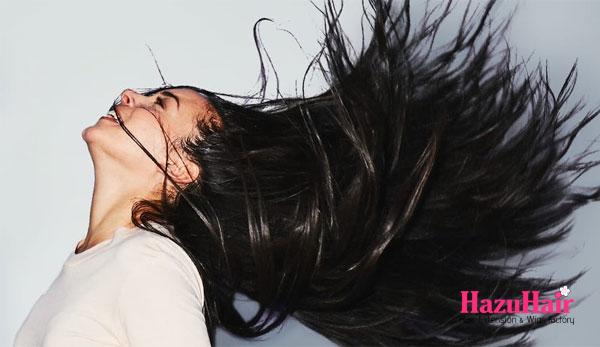
Budget Considerations
Initial Investment:
- Hair Extensions: Depending on the type and quality, extensions can vary widely in price. While some options may be budget-friendly, high-quality extensions may require a larger initial investment.
- Wigs: Similarly, wigs can also range in price. Human hair wigs tend to be more expensive but offer longer-lasting wear. Assess your budget and determine which option aligns with your financial considerations.
Long-Term Costs:
- Hair Extensions: Extensions may incur additional costs for professional installation and maintenance, especially if you choose semi-permanent types. Factor in these costs when evaluating your budget.
- Wigs: Wigs may involve fewer long-term costs, as they are typically a one-time purchase. However, consider the need for maintenance products or potential replacements if the wig shows signs of wear.
Maintenance and Care Requirements
Time and Effort:
- Hair Extensions: If you enjoy caring for and styling your hair, extensions may suit you well. However, they do require regular maintenance to keep them looking their best.
- Wigs: If you prefer a low-maintenance hair option, wigs can be easier to manage since they typically require less daily upkeep. Evaluate how much time you’re willing to dedicate to hair care.
Knowledge and Skills:
- Hair Extensions: Consider your comfort level with hair styling and application methods. If you’re experienced with hair care, you might enjoy working with extensions.
- Wigs: If you prefer simplicity, wearing a wig may be more suitable, especially if you are unfamiliar with hair styling techniques.
Health Considerations
Scalp Sensitivity:
- Hair Extensions: If you have a sensitive scalp, ensure that you choose gentle application methods and high-quality extensions that won’t irritate your skin.
- Wigs: For individuals with medical hair loss or sensitivities, wigs can provide coverage and comfort. Look for breathable materials to prevent irritation.
Consult a Professional
Before making a final decision, consider consulting a hairstylist or hair extension specialist. They can provide valuable insights based on your specific hair type, preferences, and lifestyle. Their expertise can help you choose the best option that meets your needs while ensuring the health of your natural hair.
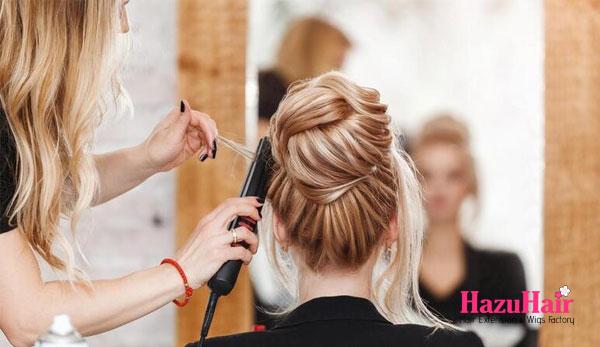
Choosing Between Hair Extensions and Wigs
When it comes to enhancing your hair, both hair extensions and wigs offer unique benefits. However, the choice between the two largely depends on individual circumstances and preferences. Here are the key factors to consider when deciding which option best suits your needs.
Factors to Consider
Lifestyle:
- Activity Level: Consider your daily activities. If you lead an active lifestyle involving sports or outdoor activities, hair extensions might be more suitable, as they can blend seamlessly with your natural hair. Wigs, while convenient, might require more careful handling to prevent damage.
- Time Constraints: Assess how much time you can dedicate to hair maintenance. Hair extensions often require more frequent upkeep, including washing, styling, and detangling. Wigs, especially synthetic ones, may be easier to manage and can simply be worn and removed as needed.
Hair Goals:
- Desired Look: Determine what look you want to achieve. Hair extensions can add volume and length, allowing you to enhance your natural hair without a complete change. Wigs, on the other hand, offer the opportunity to switch up your style dramatically, including color and length, in a matter of minutes.
- Hair Health: If you have damaged hair and want to give it a break, wigs can be an excellent option as they provide a protective barrier, allowing your natural hair to recover. Conversely, hair extensions require that your natural hair is healthy enough to support the added weight.
Maintenance Willingness:
- Care Routine: Hair extensions typically demand a more involved maintenance routine, including regular washing, conditioning, and styling. If you’re willing to commit to a hair care regimen, extensions might be a great choice. Wigs may require less frequent washing, but they also have their care requirements, such as specific cleaning products to maintain their appearance.
- Longevity: Consider how long you want your investment to last. High-quality wigs can last several months with proper care, while extensions may need to be replaced more frequently depending on their type and usage.
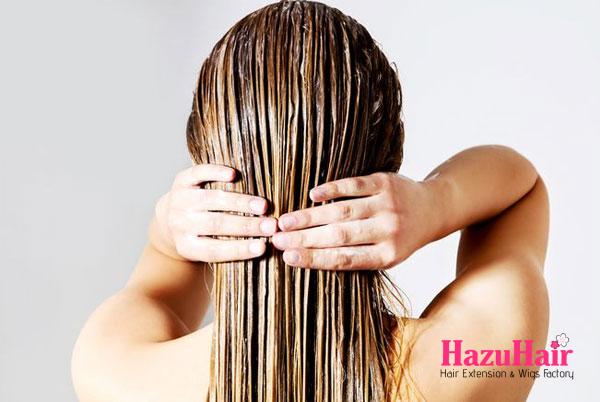
Personal Preferences and Specific Needs
Occasional Use vs. Everyday Wear:
- Occasional Use: If you’re looking to switch up your look for special events or occasions, wigs may be the more practical choice. They are easy to put on and remove, allowing for quick style changes without any commitment. Additionally, they can be stored away when not in use, giving you versatility without the hassle.
- Everyday Wear: If you intend to wear extensions or wigs daily, consider comfort and durability. Hair extensions can be more comfortable for daily wear as they integrate with your natural hair. However, ensure you select high-quality extensions that match your hair texture. Wigs designed for everyday wear should offer a secure fit and be made of materials that are breathable and comfortable against the scalp.
Budget Considerations:
Think about your budget for hair enhancements. Wigs can vary greatly in price, from affordable synthetic options to high-end human hair wigs. Hair extensions also range in price depending on type, quality, and application method. Consider the long-term investment; sometimes spending more upfront can lead to better quality and longer-lasting results.
Aesthetic Preferences:
Your personal style and aesthetic should influence your choice. If you prefer the versatility of changing styles frequently, wigs may appeal to you. If you love the idea of adding volume or length without altering your overall appearance too much, hair extensions could be the ideal solution.
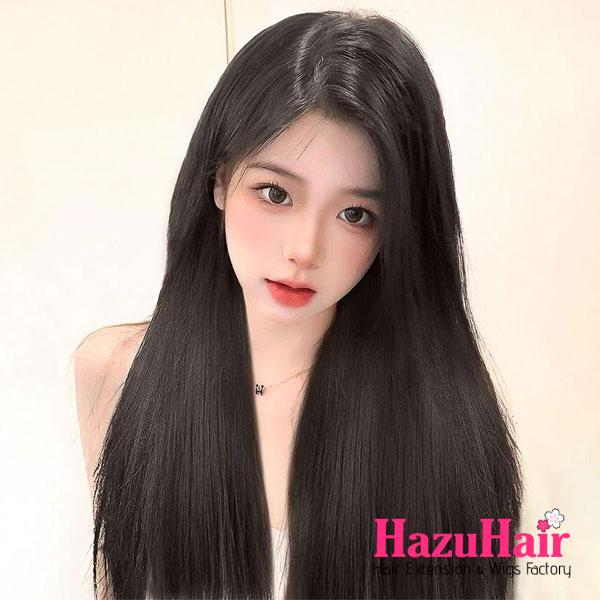
Conclusion
In summary, understanding the differences between hair extensions and wigs is essential for making an informed decision that aligns with your personal style and hair care needs.
As you consider your options, it’s important to explore both hair extensions and wigs based on your individual preferences and needs. Think about factors such as your lifestyle, desired hair goals, and willingness to maintain your chosen option. Whether you’re looking for a temporary change for a special occasion or a longer-term solution to enhance your everyday style, both options offer unique benefits.
Finally, remember that proper care is crucial for maintaining the quality and appearance of both hair extensions and wigs. Adhering to a consistent care routine will not only enhance the longevity of your chosen product but will also ensure that you continue to enjoy its beauty and functionality. Investing time and effort into the care of your extensions or wig will pay off, allowing you to look and feel your best every day.
By weighing the pros and cons of each option and considering your specific circumstances, you can confidently choose the right hair enhancement method that complements your style and meets your needs.
and…

If you’re looking to buy high-quality wigs or hair extensions, look no further than HazuHair.
We are a trusted Vietnamese hair factory with over 100 skilled workers, offering a wide range of hair styles including wavy, curly, straight, kinky, and more.
Our products come in various colors such as natural black, ombre, blonde, red, pink, and many others.
Reach out to us today!
- Hair Factory: Tan Son 2 Village, Tan Dinh, Lang Giang, Bac Giang Province, Vietnam
- Hotline: +849 4949 3883
- Whatsapp Mrs ThanhLam: https://wa.me/84949493883
- Website: https://hazuhair.com
